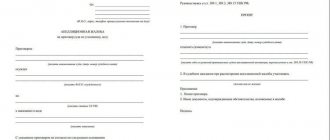In court hearings in criminal or civil cases, the interrogation of a witness is the most important evidence that directly affects the substance of the court decision. The interrogation procedure in court must fully comply with procedural requirements, otherwise witness testimony may be excluded from admissible evidence. Previously, we have already drawn the reader’s attention to the features of interrogation by an investigator at the stage of preliminary investigation (read here). In this article we will talk about the features of questioning witnesses in court.
How to call a witness to court in a criminal case
Usually, participants in a criminal case do not need to take measures to ensure that witnesses appear in court. At the end of the indictment for each case there is a list of persons who must be summoned to court, it looks like this:
| LIST of persons to be summoned to the court hearing: 1. Accused: R.O Parusov, registered at the address: Tyumen, st. Krasnaya, 3; Currently, he has been chosen as a preventive measure in the form of detention and is being held in pre-trial detention center-2 2.Defender: lawyer of the Tyumen branch of the Bar Association K.U. Mironov. 3. Victim: Lukina S.L., registered and lives at the address: Tyumen, st. Polomenskogo, 18, apt. 10 Prosecution witnesses: 4. Boldyrev K.D., registered and resides at the address: Tyumen, st. Pisareva, 10 5. Rybakov A.P., registered and resides at the address: Tyumen, st. Dybenko, 12, apt. 6 Defense witnesses: 6. Permyakov S.S., registered and resides at the address: Tyumen, st. Tarasova, 239, apt. 1 Investigation Department Investigator crimes against property P.R. Malkov |
As can be seen from the above list, it contains both prosecution witnesses and defense witnesses (the latter are usually fewer in number). The responsibility to ensure attendance at the hearing lies with the court staff, whose employees send out subpoenas. At the same time, both the victim and the defense have the right to call additional witnesses, they may be:
- persons who were interrogated by the investigator, but he did not consider it necessary to include them in the list;
- persons whose interrogation was refused during the investigation - the parties have the right to declare them again, already at the stage of the court hearing;
- those people whom no one knew about before the trial (for example, a lawyer conducted his own investigation and identified an eyewitness).
Thus, there is no need to file a separate reasoned petition for the interrogation of those included in the list of indictments or indictments.
If a party has come to the conclusion that it is necessary to interrogate other people, a request for this can be made either orally or in writing. Regardless of the form of the application, calling an additional witness must be motivated by:
To the Leninsky District Court of Tyumen, Judge G.P. Stryukina. Lukina S.L., the victim in the case against Parusov R.O., accused of committing a crime under paragraph “a” of Part 3 of Art. 158 of the Criminal Code of the Russian Federation (theft with illegal entry into a home)
Petition (SAMPLE) for questioning a witness in court
Your Honor! I ask you to summon and interrogate as a witness for the prosecution citizen E.S. Polyakova, living at the address: Tyumen, st. Moskovskaya, 34. Polyakova E.S. is a postman, she brought me a pension in the amount of 8,000 rubles on the eve of the theft. Taking into account the position of Parusov R.O. that he did not steal money, I consider this person an important witness who can confirm the presence of money in my apartment at the time of the theft.
Based on the above, guided by clause 5, part 2, art. 42 Code of Criminal Procedure of the Russian Federation,
ASK:
Summon and interrogate E.S. Polyakova at the court hearing. Send her a summons to the address I indicated.
Lukina S.L., date, signature
Before filing such a petition, we recommend that the court consider the following:
- it is usually submitted after the interrogation of all persons who were named in the list attached to the indictment. At the same time, if it is more expedient to bring a witness earlier than “scheduled,” the law allows this;
- we do not recommend making copies of the petition for other participants (there is no need for the opposite party to provide access to the personal data of the summoned person), especially since the Code of Criminal Procedure of the Russian Federation does not contain a corresponding requirement for this;
- Once again, make sure that the data specified in the application is correct: full name, residential address, you can also indicate a telephone number for direct contact with a potential witness;
- if you need to summon a minor for questioning, this must be done through his legal representative, that is, parents, guardians (for more information about questioning minors, read our article);
- If you can ensure the attendance of a witness yourself, you are allowed to bring him with you to the court hearing. In accordance with criminal procedure legislation, the court does not have the right to refuse to interrogate persons who have already appeared at the start of the proceedings. Thus, you will take all measures to ensure that your application is unconditionally granted. In this case, you can do without writing and submit your petition orally.
Question: What to do if the court refuses to question a witness?
Answer : Act according to the circumstances: you can present other evidence (documents, video recordings, testimonies of other persons), and then once again submit a similar request to interrogate the same person. At the same time, draw the court’s attention to the fact that the evidence presented must be supported by the testimony of the person whose appearance you insist on. If the evidence is exhausted and you can no longer present anything to the court, all that remains is to appeal the refusal to satisfy the petition in an appeal against the verdict (the Code of Criminal Procedure of the Russian Federation does not provide for a separate appeal procedure). The complaint can also raise the issue of summoning persons - if the appellate court considers the petition to be motivated, an interrogation can be conducted when reviewing the decision.
We remind the reader that in criminal cases considered under the rules of special proceedings, witnesses are not called or questioned (read more about the special procedure for considering criminal cases here).
Characteristics of the mancipation procedure according to the Laws of XII Tables
The entire Roman society was based on the remnants of tribal relations. This can be judged by the laws of the twelve tables. Formalism remained a distinctive feature of this legislative technique. Its most typical manifestation was the rite of mancipation.
As described above, things were divided into mancipable and non-mancipable. Their differences were based on economic significance. Both groups were privately owned. But the differences regarding rights were based on the procedure for alienation of property. The development of legal relations in the historical period of the 12 tables was characterized by the use of different methods of obtaining property rights. The oldest formal form for the assignment of property was precisely the conduct of such a ceremony.
Why was such an action necessary? Apparently, because in the future the question could arise about the legality of ownership of the thing by its current owner. The ceremony performed confirmed the legality of the transaction.
As for unmancipated things, their transmission was based on tradition. There was a normal sale, without any formalism. The process of mancipation, rooted in the tribal system, was used in parallel with the mechanism of the emergence of private property. At this time, representatives of the Roman elite began to gradually seize communal property. But ancient customs remain a rather influential factor. Therefore, the process of mancipation served as a certain barrier to the transfer of the main property objects into private hands.
When the witness failed to appear
In many cases, judges are faced with the failure of summoned persons to appear in court. Here are some examples:
- A summons was sent to the person, he received it, but does not want to appear. In this case, at the request of the parties, the court has the right to issue a decree on the delivery, which is transferred to a special department of the bailiff service that carries out forced delivery. The resolution specifies the date and time of the court hearing to which the witness must be brought.
- If a subpoena has been sent, but there is no information about its receipt and the bailiffs have established that another person lives at the address indicated in it, the court has the right to request information about the person from the City Address Bureau, and then send the subpoena to a new address. The court does not have the right to put a person on the wanted list or instruct the police to establish the whereabouts of a witness.
- When a person summoned to court is not hiding and wants to come according to the summons, but cannot do this due to physical conditions (for example, due to illness), the court may decide on a mobile court hearing.
- If a witness changed his place of residence during the investigation and at the time of the trial lives in another region, the court has the right to decide to conduct video conferencing - video conferencing. The procedure is that a person appears in court in the city of his place of residence at the appointed time. At the same time, the court panel is assembled in the city where the case is being considered, the participants can see the witness on the screen, they can hear him, they can ask him questions, etc. Thus, with the help of technology, the “effect of presence” of a person in the courtroom is achieved.
- In some cases, the witness may be “classified.” This means that his data (full name, place of residence, year of birth, etc.) is not disclosed to anyone and is available only to the judge. For security purposes, such a person is assigned a pseudonym at the investigation stage. Such persons are interrogated in court via audio link: in the courtroom, his testimony is heard over the audio system by all participants, but his voice is changed using electronic technology. During the interrogation, the witness is in a special room outside the court session; he also hears questions, explanations of rights and obligations, that is, the entire course of the proceedings.
- The person does not appear in court for unknown reasons: the summons is returned and not actually served, the bailiffs have not established any information about the location, the request to the Address Bureau was unsuccessful. In such cases, the Code of Criminal Procedure of the Russian Federation allows the court (even if one of the parties disagrees) to read out the testimony of a witness given during the investigation, subject to certain conditions:
- upon the death of a witness or a serious illness that prevents him from appearing in court (this means an illness of such severity that even an on-site court hearing is inappropriate and can harm a person’s health);
- if the person summoned to court is a citizen of another state and refuses to appear for questioning;
- the person’s failure to appear is due to a natural disaster or other emergency that makes it impossible to appear in court (for example, an earthquake, a major regional accident, etc.);
- if it was not possible to establish the whereabouts of the person (all measures were taken: requests were sent to the AB, summonses were sent to all known addresses, and bailiffs were instructed to ensure appearance in court).
If both parties to criminal proceedings agree to the disclosure of the testimony of a witness that he gave during the investigation, the court may decide on the disclosure, regardless of the presence of one of the above grounds.
Delivery of the summons to the summoned person
It is necessary to understand how the process of transmitting a subpoena occurs. The law provides for several possibilities, which are specified in Part 2 of Article 188 of the Code of Criminal Procedure of the Russian Federation.
- Personally against signature. If the person being called is absent for some reason, then the recipient can be any relative who lives together. This is a standard method that involves the official going to the summoned person's home and serving a summons. The latter must sign for receipt. However, it is quite rare to use this method, since many do not live at the place of registration.
- Using available means of communication. Mail, phone, instant messengers, phone call. However, this method raises many questions among lawyers, since it is not clear who is really transmitting the message. When making a call, it can be difficult to prove that the official conveyed information, so they often try to use instant messengers. There is a read mark there. But you need to know who owns the phone.
- By mail at your place of work. If it is impossible to establish the actual location of the person being called, you can transmit the message through the employer. The letter is sent to the address of the company or delivered personally by an official to the person responsible for receiving the correspondence.
- On behalf of officials, it is transferred to organizations that are obliged to provide the document directly to the recipient. For example, it is known that a particular citizen must appear for a medical examination at a certain time. Then it is allowed to provide the document to the doctor who will examine this person.
Extract from Article 189 of the Code of Criminal Procedure of the Russian Federation
It is worth understanding that recipients do not always want to receive this letter. Therefore, law enforcement officials have to be creative. For example, they leave it with neighbors, put it under the door, and so on. At the same time, everything is recorded on camera, so that later it cannot be said that the letter was not received.
Important! The subpoena must be served only by legal means. If you use methods that violate the provisions of the current legislation, then the fact of delivery is recognized by the court as invalid. As a result, the information obtained during the interrogation is also rejected by the court and is not attached to the case.
If a minor is summoned, then it is necessary to act through legal representatives.
Criminal Procedure Code of the Russian Federation
Procedure for questioning a witness in court
The first to begin interrogation is the one on whose side the witness is. So, if a witness for the prosecution appears (you must be guided by the list of persons in the indictment - it indicates the status of each), the state prosecutor interrogates him first.
If there are several representatives of the party (for example, the defendant has several lawyers), the issue of priority among them is resolved by them independently. The interrogation of a person who is additionally summoned (that is, based on a petition) begins with the person who filed such a petition.
The procedure for questioning in court is as follows:
- The court announces the full name of the person who appeared for questioning, as well as “whose” this witness is: the prosecution or the defense.
- The citizen is removed from the courtroom before the start of his interrogation. He should not be present when other persons (accused, victims) testify, as well as when resolving procedural issues (extending the period of detention, resolving motions to exclude evidence, etc.). The witness is not allowed to talk with other participants in the meeting, including relatives, loved ones and other witnesses present.
- The judge invites the summons into the courtroom, finds out whether he has or does not have family ties with the defendant, the victim, and explains the right not to testify against himself and his relatives. The obligation to testify is brought to the attention of the public, responsibility under Art. 307, 308 of the Criminal Code of the Russian Federation for giving false testimony and refusal to testify, the witness signs the so-called “subscription”, thereby confirming that he understands these norms of the criminal law. A citizen is provided with a translator if he does not speak (or speaks little) Russian.
- Usually the interrogation begins with the questions: “What do you know about the case? What can you tell us about what happened? What have you seen regarding the crime that is being prosecuted?” This gives the witness the opportunity to freely state whatever he considers necessary.
- The party that invited the witness asks clarifying questions. It is unacceptable to ask leading questions (that is, those that suggest the “right” answer), as well as questions that are not relevant. The court, on its own initiative or at the request of a party, can “remove”, that is, cancel - the witness’s answer to them is not taken into account. Example No. 1 . During the interrogation of witness Syzranov E.N. the state prosecutor asked him a question: On February 20, 2018, did you see the defendant Karasev N.O., dressed in a red jacket, walking along the street. A villager with a Sony TV in his hands? The defense asked to withdraw this question, since it is leading: the question already contains information on the circumstances, how the defendant Karasev was dressed, what he was carrying in his hands, the brand of the TV, etc. The court agreed with the defense’s opinion and “removed” the question; the state prosecutor was asked to reformulate it.
- After the questions of the party that invited the person to court, the other party asks questions. The court has the right to interrogate at any time.
- If at the end of the interrogation procedure anyone has additional questions, they can be asked with the permission of the presiding officer. Here the order is no longer important.
During the court hearing, it is permissible to ask the witness about the documents that are present in the case. Then, with the permission of the judge, the witness may be shown specific evidence from the materials of the criminal case (for example, an invoice, an identification protocol, etc.), on which he will testify. In the protocol of the court session, this procedure is recorded in full, indicating the actions, for example: “the witness is invited to familiarize himself with the protocol for the seizure of shoes dated 03/01/2018 on sheets of case No. 123-126 in volume No. 2, after which he was asked the following question...”.
The witness has the right to use his own documents or records, but only with the permission of the court - for example, in criminal cases of an economic nature with many calculations and complex calculations. The parties have the right to request familiarization with such documents and their inclusion in the case materials.
At the end of the interrogation, the witness may exercise his right to reimbursement of expenses associated with appearing in court by submitting a written petition to the court:
To the Leninsky District Court of Tyumen, Judge G.P. Stryukina. Polyakova E.S., a witness in a criminal case against Parusov R.O., accused of committing a crime under paragraph “a” of Part 3 of Art. 158 CC
Petition for reimbursement of expenses associated with appearing in court for questioning
I ask you to issue an order to pay me the expenses incurred related to the need to appear in court to testify as a witness in a criminal case against Parusov R.O.
In connection with the summons (an agenda indicating the date and time of the meeting is attached), I had to return air tickets to Sochi (a family vacation was planned) and buy new ones for another date, while the airline withheld a commission of 5,400 rubles, and the new tickets turned out to be more expensive for 1200 rubles.
Thus, I incurred expenses totaling 6,600 rubles.
Based on the above, guided by clause 5, part 4, art. 56 of the Code of Criminal Procedure of the Russian Federation (the right of a witness to file petitions and bring complaints),
ASK:
Compensate me, Polyakova E.S., residing at the address: Tyumen, st. Moskovskaya, 34, expenses incurred in the amount of 6600 rubles, transfer to my account 000000222222, opened in branch 2323/00 of PJSC Sberbank of the Russian Federation, BIC0000000.
Enclosure: summons to appear on 03/01/2018, two air tickets, receipt of payment of the commission.
Polyakova E.S., number, signature
Carefully read the interrogation protocol and make adjustments if necessary.
After you answer all the questions, or your free time has expired, by the way, notify the inspector in advance, if your time for interrogation is limited, carefully read the interrogation protocol.
Not cursorily, not casually, but by reading the questions and answers very carefully. Your task is to check whether your answers are correctly reflected in the protocol and whether there is any double meaning in them. The inspector will interpret your answers in his favor. Remember – your tasks are radically different! From the inspector - to get as much information as possible, from you - to tell as little as possible in general terms.
If you find inaccuracies or ambiguous wording in the protocol, ask the inspector to make changes. Explain what exactly you meant and what the phrase should look like.
Repeated interrogation
Often the parties consider it necessary to declare the re-examination of a particular witness in court, for example:
- after questioning other persons, it became necessary to eliminate contradictions;
- the defendant gave evidence where he spoke about the events, but the witness questioned earlier kept silent about this in his testimony;
- Circumstances arose indicating a discrepancy between the testimony of the previously interrogated person and the established facts.
A request for another interrogation must be especially carefully motivated, because you need to convince the judge that a second procedure is necessary to consider the case. Sometimes a citizen who has already been interrogated earlier, with the permission of the presiding officer, remains in the hall, and questions arise to him while another person is testifying. The judge has the right to simultaneously clarify something with the person remaining in the room; this is called cross-examination.
Here is an example of a court hearing in one of the cases:
Presiding Judge: Witness E.N. Cherkasov, the interrogation is over, I suggest you take a seat in the courtroom, there may be additional questions for you. Secretary, invite witness K.E. Petrov.
Petrov K.E. (enters the hall): Hello.
Chairman: Come in, witness, introduce yourself.
Petrov K.E.: I am Petrov Konstantin Evgenievich, born on November 18, 1990, I live in Moscow, st. Perechnaya, 19.
Presiding Judge: I explain to you the rights and obligations (listed), as well as responsibility for giving false testimony and for refusing to give testimony. You do not have to testify against yourself or your close relatives. Tell me, witness, do you know the plaintiff or the defendant?
Petrov K.E.: No, these persons are not familiar to me.
Presiding: Do you know witness E.N. Cherkasov?
Petrov K.E.: No, I don’t know.
Presiding Judge: Witness E.N. Cherkasov, tell me, do you still insist that you knew K.E. Petrov?
Cherkasov E.N. (located in the hall): Yes, we studied with him in parallel groups at the institute.
Presiding Judge: Witness Petrov K.E., do you insist that you did not know each other?
Petrov K.E.: Sorry, I didn’t immediately remember the appearance of E.N. Cherkasov, indeed, I studied with him and know him.
Chairman: Tell us what you know about the case.
This is how, with the help of simultaneous interrogation of two persons, the court quickly eliminated the contradiction that arose as a result of the testimony. In this case, the method of “cross-examination” was used.
Things that are manipulable and unmanipulable
Among the mancipated there were things that had the greatest value and were economic objects. These primarily included:
- slaves;
- livestock used in agriculture;
- estates of Roman citizens located within Rome;
- land easements (the most important objects of rights to things that acted in the archaic period as collective family property).
All other things, the sale of which was informal, were unmancipated. These included:
- lands outside Italy;
- animals not typical for these places, such as camels;
- all types of clothing;
- household items, for example, dishes;
- jewelry.
For such objects, it was enough to commit an act of tradition, the essence of which was to actually change the owner.
To understand that this is mancipation in Ancient Rome, one cannot do without considering the rite itself.
False testimony
Despite the fact that each witness is warned about criminal liability for giving false testimony, there are often situations when a citizen reports information that is clearly inconsistent with the circumstances of the case. In such situations, it is possible to initiate a criminal case by sending a statement to law enforcement agencies, but only if there is reliable information about the intent of the interrogated person. After all, sometimes people are called to court months or even years after the events and may not remember everything (for example, as in our example, the witness simply forgot the appearance of the person he was asked about).
Due to forgetfulness, testimony may be given that differs from the pre-trial one. The indictment contains the testimony of all participants in the criminal case (this is a mandatory requirement of the criminal procedure law). During the in-person interrogation, both the lawyer and the state prosecutor monitor the content of the testimony that was given during the investigation and compare it with what was heard in court. If there are significant contradictions, each party has the right to file a motion to have the previous testimony read out. The court, making sure that there are contradictions, almost always agrees with the petition. In the presence of the witness, the interrogation protocol is read out, and clarifying questions are asked. If the contradictions are eliminated, to initiate a criminal case under Art. 307 of the Criminal Code of the Russian Federation is out of the question.
At the same time, when a witness deliberately changed his testimony and openly lies, he faces a fine of up to 80,000 rubles , as well as compulsory or correctional labor. Those who provided false information to the court and this resulted in another person being held accountable for committing a grave or especially grave crime may be punished by imprisonment for up to 5 years .
We remind you that from liability under Art. 307 of the Criminal Code of the Russian Federation, release is possible if a person confesses to lying before the verdict in the case is pronounced.
Learn more about liability for perjury.
Compensation for the performance of state or public duties
According to the general rule provided for in Part 2 of Art. 170 of the Labor Code of the Russian Federation , a state body or public association that has engaged an employee to perform state or public duties, pays him compensation during the performance of these duties in the amount determined by the Labor Code, other federal laws and other regulatory legal acts or by a decision of the relevant public association.
At the same time, the Labor Code for the performance of certain duties does not establish the payment of compensation, but the retention of average earnings for the employee, in particular, for persons participating in collective bargaining (Article 39 ), members of labor dispute commissions ( Article 171 ), donors ( Article 186 ), members of conciliation commissions and labor arbitrators ( Article 405 ).
But the procedure for paying for the participation in the work of trade unions of members of their elected collegial bodies who are not exempt from their main work is determined by a collective agreement or agreement ( Article 374 of the Labor Code of the Russian Federation ).
For your information
The average earnings of trade union members released from their main jobs are maintained by the all-Russian (interregional) trade union. It is retained for the period of employment (no more than six months) of the trade union worker, if at the end of his term of office the employer was unable to provide him with his previous place of work ( Article 375 of the Labor Code of the Russian Federation ).
The employer must also retain the average earnings for employees undergoing military training ( Article 6 of the Federal Law of March 28, 1998 No. 53-FZ “On Military Duty and Military Service” ). In addition, they are compensated for other expenses, for example, those associated with renting housing, travel expenses, and business trips.
However, subsequently all these expenses are reimbursed to the employer by the Ministry of Defense[1].
In other cases of performance of state and public duties, the employee receives compensation from government bodies or public associations that involved him in the performance of such duties.
You have been called: how to behave
Let's say you are a witness in a criminal case. Here are some practical tips on how to behave during interrogation in court:
- First, don't ignore the challenge. It will not be very pleasant when there is a knock on your door at 7 am - bailiffs try to bypass the addresses indicated in the arrest order as early as possible. It is your civic duty to appear and testify.
- It happens that the proceedings are postponed without starting (for example, representatives of one of the parties fall ill). Then you need to find out from the assistant judge the date of the next court hearing and receive a summons.
- Usually the person being called knows in advance under what circumstances they want to interrogate him. Try to remember well the events related to the crime in order to answer the questions posed as accurately as possible. There is no need to invent or assume if you do not remember this or that detail. It’s better to answer honestly: “I don’t remember.”
- Give your testimony confidently and clearly, provide only information that is relevant to the case. Do not focus on biographical information that is not related to the events of the crime.
- Remember that the witness does not have the right to ask questions to the participants in the process and the court. At the same time, he has the right to submit requests of various nature related to the procedural order (for example, a request for a break due to poor health, a statement about pressure exerted on him by other persons, a request for payment of expenses, etc. ).
What does a summons for questioning look like?
You need to understand what this document looks like. It is compiled using typewritten text. The following must be there:
- In the upper left corner there is a stamp of the organization from which the summons is sent, the date of preparation and the number of the outgoing document.
- In the upper right corner you must indicate to whom the letter is being sent.
- The title is “Summons to Summon for Interrogation.”
- Below is a text indicating where and what time you need to appear, and what documents you need to have with you.
- Informing about the possibility of inviting a lawyer, in accordance with the provisions of Article 50 of the Code of Criminal Procedure of the Russian Federation.
- Informing about the consequences of failure to appear.
- FIL of the official, his title and position, as well as personal signature.
- Method of transmitting information, date and time of delivery.
Summons for questioning - sample
The document must bear the seal of the organization. This way, the person being called will understand that it is an original and not a fake.
Questioning a witness in court in a civil case
The interrogation procedure in civil cases largely coincides with criminal proceedings, but there are still some differences:
- Only those persons declared by the parties are summoned to the court hearing to resolve disputes: there is no list that is drawn up before the court hearing and is mandatory for the judge.
- In civil proceedings, there is no obligation for the judge to question a witness who has appeared. If the court considers the request for questioning to be unmotivated, it may refuse to satisfy it, even if an eyewitness to the controversial events is already outside the courtroom.
- In civil cases, written testimony of witnesses cannot be accepted as evidence, unlike in criminal proceedings, where interrogation protocols given at the pre-trial stage are widely used. At the same time, in some cases, the court, when considering a civil case, can do without repeated interrogation and read out the testimony of the person given earlier in the same court hearing. Example No. 2 . When considering a claim for debt collection, an employee of the Management Company was called, who brought to the attention of the participants a detailed calculation of the debt for housing and communal services. The case was postponed due to the busyness of the defendant's representative. The CC officer was unable to appear at the next court hearing. Since the parties did not have any new questions for him, it was decided to read out the testimony he gave at the previous meeting.
- In civil proceedings, a form of interrogation by writ is permissible - the procedure will be carried out by the judge of the city where the person lives, after which the original protocol will be sent to the court where the case is being considered on the merits. In criminal proceedings, this form of providing evidence is not provided.
- In civil proceedings, interrogation of “classified” witnesses is not practiced; video conferencing is extremely rarely used. In addition, a decree on summons is rarely issued: in the consideration of disputes, the principle of adversarialism is more pronounced than in criminal proceedings; Ensuring attendance is almost entirely the responsibility of the parties, and the court's participation in the delivery of witnesses is minimal.
Review the list of possible questions
Armed with Appendix No. 1 to the Methodological Recommendations of the Investigative Committee and the Federal Tax Service (letter of the Federal Tax Service dated July 13, 2017 No. ED-4-2 / [email protected] ), it is necessary to carefully prepare for the interrogation.
This appendix contains two lists of questions: for the general director and for an ordinary employee.
A total of 80 questions recommended for use by all inspectorates during interrogations.
Speak out the answers to the questions, because sometimes to hear the “absurdity” of an argument or hear the “double meaning”, you just need to say the phrase out loud.









